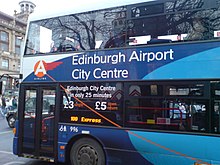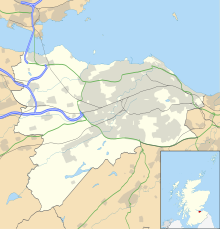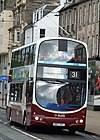Edinburgh Airport: Difference between revisions
→Passenger: New Ryanair route to Milan |
|||
| Line 423: | Line 423: | ||
|17|| [[Brussels International Airport|Brussels]]||align="right"|100,433||{{increase}} 12 |
|17|| [[Brussels International Airport|Brussels]]||align="right"|100,433||{{increase}} 12 |
||
|- |
|- |
||
|18|| [[ |
|18|| [[Abu Dhabi International Airport|Abu Dhabi]]||align="right"|99,345||{{increase}} 95 |
||
|- |
|- |
||
|19|| [[Atatürk International Airport|Istanbul]]||align="right"|97,498||{{increase}} 5 |
|19|| [[Atatürk International Airport|Istanbul]]||align="right"|97,498||{{increase}} 5 |
||
| Line 429: | Line 429: | ||
|20|| [[Munich Airport|Munich]]||align="right"|95,437||{{increase}} 7 |
|20|| [[Munich Airport|Munich]]||align="right"|95,437||{{increase}} 7 |
||
|- |
|- |
||
|21|| [[ |
|21|| [[Faro Airport|Faro]]||align="right"|84,779||{{decrease}} 5 |
||
|- |
|- |
||
|22|| [[Stockholm-Arlanda Airport|Stockholm-Arlanda]]||align="right"|83,605||{{increase}} 35 |
|22|| [[Stockholm-Arlanda Airport|Stockholm-Arlanda]]||align="right"|83,605||{{increase}} 35 |
||
| Line 437: | Line 437: | ||
|24|| [[Václav Havel Airport Prague|Prague]]||align="right"|73,992||{{decrease}} 6 |
|24|| [[Václav Havel Airport Prague|Prague]]||align="right"|73,992||{{decrease}} 6 |
||
|- |
|- |
||
|25|| [[ |
|25|| [[EuroAirport Basel–Mulhouse–Freiburg|Basel/Mulhouse]]||align="right"|72,773|| |
||
|- |
|- |
||
| colspan="5" style="text-align:right;"| <sup>''Source: [[United Kingdom Civil Aviation Authority|UK Civil Aviation Authority]]''<ref name="stats"/></sup> |
| colspan="5" style="text-align:right;"| <sup>''Source: [[United Kingdom Civil Aviation Authority|UK Civil Aviation Authority]]''<ref name="stats"/></sup> |
||
Revision as of 07:03, 19 August 2016
Edinburgh Airport Port-adhair Dhùn Èideann | |||||||||||||||
|---|---|---|---|---|---|---|---|---|---|---|---|---|---|---|---|
 | |||||||||||||||
 | |||||||||||||||
| Summary | |||||||||||||||
| Airport type | Public | ||||||||||||||
| Owner | Global Infrastructure Partners | ||||||||||||||
| Operator | Edinburgh Airport Ltd. | ||||||||||||||
| Serves | Edinburgh, Lothian, Fife, the Scottish Borders and Central Scotland | ||||||||||||||
| Location | Ingliston | ||||||||||||||
| Elevation AMSL | 136 ft / 41 m | ||||||||||||||
| Website | edinburghairport.com | ||||||||||||||
| Map | |||||||||||||||
 | |||||||||||||||
| Runways | |||||||||||||||
| |||||||||||||||
| Statistics (2015) | |||||||||||||||
| |||||||||||||||
Edinburgh Airport (Template:Lang-gd) (IATA: EDI, ICAO: EGPH) is an airport located at Ingliston in the City of Edinburgh, Scotland. It was the busiest airport in Scotland in 2015, handling 11.1 million passengers in that year, an increase of 9.4% compared with 2014. It was also the sixth busiest airport in the UK by total passengers in 2015.[2] It is located 5 nautical miles (9.3 km; 5.8 mi)*[1] west of the city centre and is situated just off the M8 and M9 motorways. It is owned and operated by Global Infrastructure Partners, which also owns and operates Gatwick Airport and London City Airport.[3] The airport features two runways and one passenger terminal, and employs about 2,500 people.
History
Early years
Turnhouse Aerodrome was the most northerly British air defence base in World War I used by the Royal Flying Corps. The small base opened in 1916[4] and it was used to house the 603 (City of Edinburgh) Squadron from 1925, which consisted of DH 9As, Westland Wapitis, Hawker Harts, and Hawker Hind light bombers. All the aircraft used a grass air strip.
In 1918 the Royal Air Force was formed and the airfield was named RAF Turnhouse and ownership transferred to the Ministry of Defence.
When the Second World War broke out, RAF Fighter Command took control over the airfield and a runway of 3,900 ft (1,189 m) was paved to handle the Supermarine Spitfire. During the Battle of Britain, Nos No.3 Squadron RAF3, 65, and 141 Squadrons were present at the airbase.
Post World War II
When the war ended the airfield still remained under military control, but by the late 1940s the first commercial services were launched. In 1947, British European Airways started a service between Edinburgh and London using Vickers Vikings followed by the Viscount and Vanguard series.
In 1952 the runway was extended to 6000 ft to handle the Vampire FB5s operated by the based 603 Squadron; and an aircraft carrier Catcher Net (never used) was installed to protect traffic on the adjacent A8 road. In 1956 a new passenger terminal was built to offer improved commercial service and five years later it was extended. After the disbandment of 603 Squadron in March 1957, the Ministry of Defence transferred ownership to the Ministry of Aviation in 1960 to offer improved commercial service to the airport. Flying was temporarily diverted to East Fortune, which had its runway extended to accommodate the airliners of the period.
BAA Ownership 1971 to 2012


The British Airports Authority took over ownership of the airport on April 1, 1971 at a time when the original terminal building was running at about eight times its design capacity. Though immediately improvements to the terminal were cosmetic, such as extra seating and TV monitors for flight information introduced, it took a couple of years for plans to be proposed for a completely new terminal and runway redesign. A public consultation on planning started in November 1971 and ended in February 1972. Initial stages of the redevelopment began in June 1973, which included a diversion of the River Almond. Work on the new terminal building, designed by Sir Robert Matthew, was started in March 1975 and opened officially by Her Majesty the Queen on 27 May 1977, opening to the public two days later.
Although the original main runway 13/31 (which is now 12/30) served the airport well, its alignment had the disadvantage of suffering from severe crosswinds and the other two minor runways were very short and could not be readily extended, so movements were transferred to a new runway (07/25 which has since become 06/24) in an addition completely outside the original airfield boundary. This runway, completed in 1977 is 2,556 m (8,386 ft) in length, and was able to take all modern airliners including Concorde. A new terminal was built alongside the runway to cater for the additional traffic. The old terminal and hangars were converted into a cargo centre.
International service from Edinburgh began in 1962 with a direct service to Dublin, but for many years international flights were charter and private only. This started to change during the late 1970s with direct services to continental Europe (Amsterdam, 1975,). By the mid-1980s direct routes included Paris, Düsseldorf, Brussels, Frankfurt and Copenhagen but until the Open Skies Act in 1990, all transatlantic flights had to first land at Prestwick, with very few exceptions. By the time BAA had been privatised in 1987, Edinburgh Airport handled over 1.8 million passengers each year; this was treble the number of 681,000 passengers handled in 1971 when BAA first took control of the airport.[5]
RAF Turnhouse which was operational near the passenger terminal of the airport for all of the post war period, was finally closed in 1997.[6]
Since the original terminal upgrade in 1977, there have been major reconstructions, including extensions of the two passenger terminal aprons and major expansion car parking facilities, including a multi storey car park in 2004. In 2005, a new 57 m (187 ft) tall air traffic control tower was completed at a cost of £10m (€16m). An extension to the terminal opened in September 2006 called the "South East Pier". This extension initially added six gates on a new pier to the South-East of the original building. A further four gates were added to the South East Pier at the end of 2008.
On 19 October 2011, BAA Limited announced its intention to sell the airport, following a decision by the UK's Competition Commission requiring BAA to sell either Glasgow International or Edinburgh Airport.[7] BAA announced on 23 April 2012 that it had sold Edinburgh Airport to Global Infrastructure Partners for a price of £807.2 million.[8]
Expansion
Passenger traffic at Edinburgh Airport reached a record level in 2015 with over 11.1 million passengers[9] and over 109,000 aircraft movements.[2] In 2013, a further extension to the passenger terminal was announced, taking the terminal building up to the Edinburgh Airport tram stop. The opening of the Edinburgh Trams in May 2014 created the first rail connection to Edinburgh Airport. Whilst the number of passengers has increased, the number of flights has actually seen a decrease in 2014 due to planes operating at higher capacity.[10] The terminal building is currently being expanded with an investment of £40m ($64m). A new £25m ($40m) expansion project involving the construction of a new 6,000m² building, housing a security hall and retail areas, is also currently underway at the airport. On the 23rd of February 2016, Ryanair announced a growth of 20% bringing annual passenger capacity from the airline at Edinburgh Airport to 2.5 million. This was coupled with the news of six new services to Ryanair's winter schedule from Edinburgh in addition to more services on its popular European destinations. Furthermore, in February 2016, consultancy firm, Biggar Economics, announced that Edinburgh Airport contributes almost £1 billion into the Scottish economy every year.[11]
Airlines and destinations
Passenger
Cargo
| Airlines | Destinations |
|---|---|
| ASL Airlines Belgium | East Midlands, Liège |
| DHL Aviation | East Midlands |
| Jet2.com operated for Royal Mail | East Midlands, London-Stansted |
| Loganair operated for Royal Mail | Aberdeen, Inverness |
| Titan Airways operated for Royal Mail | London-Stansted |
| Star Air (Maersk) operated for UPS Airlines | Cologne/Bonn, East Midlands |
Statistics
Passenger numbers
| Edinburgh Airport Passenger Totals 1985–2015 (millions) |
|---|
 |
| Source: These statistics are combined BAA and CAA figures pre-1996, Edinburgh Airport: A History; McCloskey, Keith. Post 1996: United Kingdom Civil Aviation Authority[2] |
| Number of Passengers[nb 1] | Number of Movements[nb 2] | |
|---|---|---|
| 1985 | 1,578,000 | 36,926 |
| 1986 | 1,651,000 | 36,596 |
| 1987 | 1,852,000 | 39,603 |
| 1988 | 2,080,000 | 40,664 |
| 1989 | 2,369,000 | 47,100 |
| 1990 | 2,495,000 | 47,900 |
| 1991 | 2,343,000 | 49,700 |
| 1992 | 2,539,000 | 56,400 |
| 1993 | 2,721,000 | 58,800 |
| 1994 | 3,001,000 | 61,100 |
| 1995 | 3,280,000 | 64,000 |
| 1996 | 3,810,000 | 68,800 |
| 1997 | 4,214,919 | 99,352 |
| 1998 | 4,588,507 | 100,134 |
| 1999 | 5,119,258 | 101,226 |
| 2000 | 5,519,372 | 102,393 |
| 2001 | 6,067,333 | 112,361 |
| 2002 | 6,930,649 | 118,416 |
| 2003 | 7,481,454 | 118,943 |
| 2004 | 8,017,547 | 125,317 |
| 2005 | 8,456,739 | 127,122 |
| 2006 | 8,611,345 | 126,914 |
| 2007 | 9,047,558 | 128,172 |
| 2008 | 9,006,702 | 125,550 |
| 2009 | 9,049,355 | 115,969 |
| 2010 | 8,596,715 | 108,997 |
| 2011 | 9,385,245 | 113,357 |
| 2012 | 9,195,061 | 110,288 |
| 2013 | 9,775,443 | 111,736 |
| 2014 | 10,160,004 | 109,545 |
| 2015 | 11,114,587 | 115,286 |
Busiest routes
| Rank | Airport | Passengers handled | % change 2014/15 | |
|---|---|---|---|---|
| 1 | London-Heathrow | 1,383,915 | ||
| 2 | London-Gatwick | 672,948 | ||
| 3 | London-Stansted | 622,172 | ||
| 4 | London-City | 532,857 | ||
| 5 | Bristol | 351,954 | ||
| 6 | Birmingham | 277,911 | ||
| 7 | London-Luton | 266,562 | ||
| 8 | Belfast-International | 262,773 | ||
| 9 | Southampton | 194,058 | ||
| 10 | Belfast-City | 137,972 | ||
| 11 | Manchester | 114,095 | ||
| 12 | East Midlands | 95,307 | ||
| 13 | Cardiff | 69,229 | ||
| 14 | Exeter | 45,115 | ||
| 15 | Sumburgh | 44,786 | ||
| Source: UK Civil Aviation Authority[2] | ||||
| Rank | Airport | Passengers handled | % change 2014/15 | |
|---|---|---|---|---|
| 1 | Amsterdam | 621,195 | ||
| 2 | Dublin | 540,651 | ||
| 3 | Paris-Charles de Gaulle | 300,611 | ||
| 4 | Frankfurt am Main | 192,077 | ||
| 5 | Copenhagen | 191,896 | ||
| 6 | Madrid | 162,499 | ||
| 7 | Geneva | 162,353 | ||
| 8 | Palma de Mallorca | 157,056 | ||
| 9 | Alicante | 150,000 | ||
| 10 | Málaga | 144,401 | ||
| 11 | Newark | 143,414 | ||
| 12 | Tenerife-South | 135,462 | ||
| 13 | Barcelona | 121,895 | ||
| 14 | Kraków | 117,527 | ||
| 15 | Doha | 115,529 | ||
| 16 | Milan-Malpensa | 113,892 | ||
| 17 | Brussels | 100,433 | ||
| 18 | Abu Dhabi | 99,345 | ||
| 19 | Istanbul | 97,498 | ||
| 20 | Munich | 95,437 | ||
| 21 | Faro | 84,779 | ||
| 22 | Stockholm-Arlanda | 83,605 | ||
| 23 | Oslo-Gardermoen | 81,774 | ||
| 24 | Prague | 73,992 | ||
| 25 | Basel/Mulhouse | 72,773 | ||
| Source: UK Civil Aviation Authority[2] | ||||
Access and ground transportation
Road

The airport lies on the A8 Glasgow-Edinburgh road, and can be easily reached by the M8 (from Glasgow) and the M9 (from Stirling). The airport is also within easy access from the M90 motorway (from Perth) via the Forth Road Bridge.
Lothian Buses provide public transportation to the airport with the Airlink 100 express bus from Edinburgh city centre,[21] as well as the number 35 direct to Ocean Terminal and N22 with the same destination but alternative route. Additionally, Stagecoach operates the newly formed JET express bus service, previously AirDirect 747 between the airport and Inverkeithing railway station and Ferrytoll Park and Ride in Fife.[22]
Tram

The airport is served by Edinburgh Trams, a light rail link from the terminal to Edinburgh city centre. The system runs from Edinburgh Airport tram stop and travels across the western suburbs of Edinburgh on a segregated track; when the trams reach Haymarket railway station they switch to street-running mode and travel through the city along Princes Street. Edinburgh Trams began operation on 31 May 2014.[23][24]
Train
There are currently no direct rail links to Edinburgh Airport, although it lies very close to the Fife Circle and the Edinburgh-Glasgow railway lines. A project to build the Edinburgh Airport Rail Link was cancelled in 2007 after a change in Government.[25]
As a cheaper alternative to the cancelled Edinburgh Airport Rail Link project, an additional interchange station is currently being constructed on the Fife Circle Line. Edinburgh Gateway station will provide an interchange with airport tram services. This station and upgrades were finally approved by the Scottish Parliament in 2012.[26] The station is expected to open by December 2016.
Accidents and incidents
- On 27 February 2001, a Loganair Shorts 360 (G-BNMT) operating a Royal Mail flight to Belfast, crashed into the Firth of Forth shortly after taking off from Edinburgh at 1730 GMT. Both crew members were killed, and there were no passengers on board. A fatal accident inquiry later blamed a buildup of slush in the aircraft's engines before the crash. Protective covering had not been fitted to the engine intakes while the aircraft was parked for several hours in heavy snow at Edinburgh.[27][28]
Accolades
- 2011 – 2nd Best Airport in Europe of the Airport Service Quality Awards by Airports Council International[29]
Notes
References
- ^ a b "NATS – AIS – Home". ead-it.com.
- ^ a b c d e f "Aircraft and passenger traffic data from UK airports". UK Civil Aviation Authority. 25 March 2016. Retrieved 4 April 2016.
- ^ "Global Infrastructure Partners". global-infra.com.
- ^ "EDI Facts and figures". '"Edinburgh Airport. Retrieved 1 June 2016.
{{cite web}}: Italic or bold markup not allowed in:|work=(help) - ^ Edinburgh Airport: A History; McCloskey, Keith; 2006
- ^ "Site Record for Edinburgh, RAF Turnhouse". Canmore. RCAHMS. Retrieved 8 January 2013.
- ^ "Heathrow: About us – Heathrow". baa.com.
- ^ Heathrow. "Press Releases". baa.com.
- ^ "Edinburgh Airport hails record year". BBC News. 11 January 2016.
- ^ ^ CAA: UK Annual Airport Statistics
- ^ "Edinburgh Airport Brings in the Bucks". Airport Parking Market. 26 April 2016.
- ^ Delta resumes JFK to Edinburgh Flights
- ^ http://www.jet2.com/
- ^ a b http://www.jet2.com/destinations/edinburgh-destinations-map
- ^ a b c http://www.heraldscotland.com/news/14459849.Budget_airline_adds_three_new_Scottish_destinations_for_record_breaking_summer_2017_schedule/
- ^ "New Edinburgh-Milan Bergamo Route Launched For Summer 2017". Retrieved 17 August 2016.
- ^ "Oslo Rygge Base Closure & 16 Route Cancellations After Norwegian Govt Introduces Environmentally Friendly Tax". Ryanair. 1 June 2016. Retrieved 1 June 2016.
- ^ "SAS Website". Retrieved 1 July 2016.
- ^ a b "Thomson Airways". TUI Group. Retrieved 2 May 2016.
- ^ http://wowair.co.uk/
- ^ "Edinburgh Airport – City Centre frequent express shuttle". Lothian Buses. Retrieved 20 January 2010.
- ^ "Airdirect 747". Stagecoach Group. Retrieved 20 January 2010.
- ^ "Edinburgh's trams roll into action". BBC News.
- ^ "Route map". Edinburgh Trams. 2009. Retrieved 20 January 2010.
- ^ "It's £30m down the drain". The Scotsman. Edinburgh. 27 September 2007. Archived from the original on 5 June 2011. Retrieved 20 January 2010.
{{cite news}}: Unknown parameter|deadurl=ignored (|url-status=suggested) (help) - ^ Stevenson, Stewart (27 September 2007). "Edinburgh Airport Rail Link". Scottish Parliament. Retrieved 12 January 2010.
- ^ Scotsman: Pilots praised as sheriff confirms snow caused crash, 13 November 2003
- ^ Harro Ranter (27 February 2001). "ASN Aircraft accident Shorts 360-100 G-BNMT Granton Harbour". aviation-safety.net.
- ^ "ASQ Award for Best Airport in Europe" Airports Council International. 14 February 2012. Retrieved 13 April 2012
External links
![]() Media related to Edinburgh Airport at Wikimedia Commons
Media related to Edinburgh Airport at Wikimedia Commons
- Official website
- Edinburgh Airport Consultative Committee
- EDINBURGH AIRPORT, TURNHOUSE (1971) (archive film from the National Library of Scotland: SCOTTISH SCREEN ARCHIVE)
- Current weather for EGPH at NOAA/NWS
- Accident history for EDI at Aviation Safety Network




